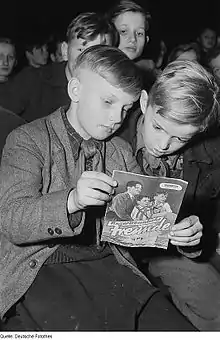Progress Film
Progress Film is a German film distributor. It was established in 1950 to handle the release of films produced by DEFA, the state-controlled production outfit of communist East Germany. Since 1989 Progress distributes the entire DEFA film collection.
 | |
| Website | www.PROGRESS.film |
|---|---|
History

Progress was founded on 1 August 1950 as a German–Soviet company. Like DEFA, Progress Film was a monopoly company, and its films were carefully vetted by the regime for their content. Progress took over this role in the early 1950s from Sovexport, a Soviet-controlled company which operated during the period following the Battle of Berlin in 1945 and the Allied Occupation of Germany. Rudolf Bernstein and Georgri Nikolayevich Nikolayev, later director of Soviet film production Lenfilm, were appointed German and Soviet directors.[1]
Progress was the only film distributor in the German Democratic Republic and produced around 12,000 films in nine decades. Almost half of them were feature films and documentaries by DEFA, the only film studio in the GDR:[2]
- 950 DEFA feature films and short feature films
- 5,700 DEFA documentary films and newsreels
- 2,500 GDR commissioned films (NVA, Ministry of the Interior of the GDR and others)
- 820 DEFA animated films
- 4,000 DEFA synchronizations (e.g., Eastern European film classics)
- 40 German and European Arthouse films (feature, children's and documentary films)
Actors such as Armin Mueller-Stahl, Manfred Krug, Corinna Harfouch and Ulrich Mühe and filmmakers like cinematographer Joris Ivens and directors such as Konrad Wolf, Heiner Carow and Frank Beyer began their careers in DEFA films.
Progress also distributed foreign film imports, particularly those from other Eastern Bloc countries. In 1950 the company handled the release of the Stalinist epic The Fall of Berlin in East Germany.
After the fall of the Berlin Wall in 1989, Progress—on behalf of the DEFA Foundation—began marketing the entire collection of films that show a now non-existent country.[3] Other collections from the 20th century were added. Many of the former East German films were re-released and became cult classics.[4]
Since 1 April 2019, the entire film heritage of the GDR has been made internationally accessible on the platform PROGRESS.film.[5]
References
- "Filmhandel (Außenhandel)". DEFA Stiftung. Retrieved 12 May 2019.
- "Progress Film Verleih". Filmportal. Retrieved 12 May 2019.
- Müller, Jochen. "Progress Film Verleih vermarktet DEFA-Filme weiterhin". Blickpunkt:Film. Retrieved 12 May 2019.
- Heiduschke p.33
- "PROGRESS.film". Retrieved 28 June 2019.
Bibliography
- Sebastian Heiduschke. East German Cinema: DEFA and Film History. Springer 2013